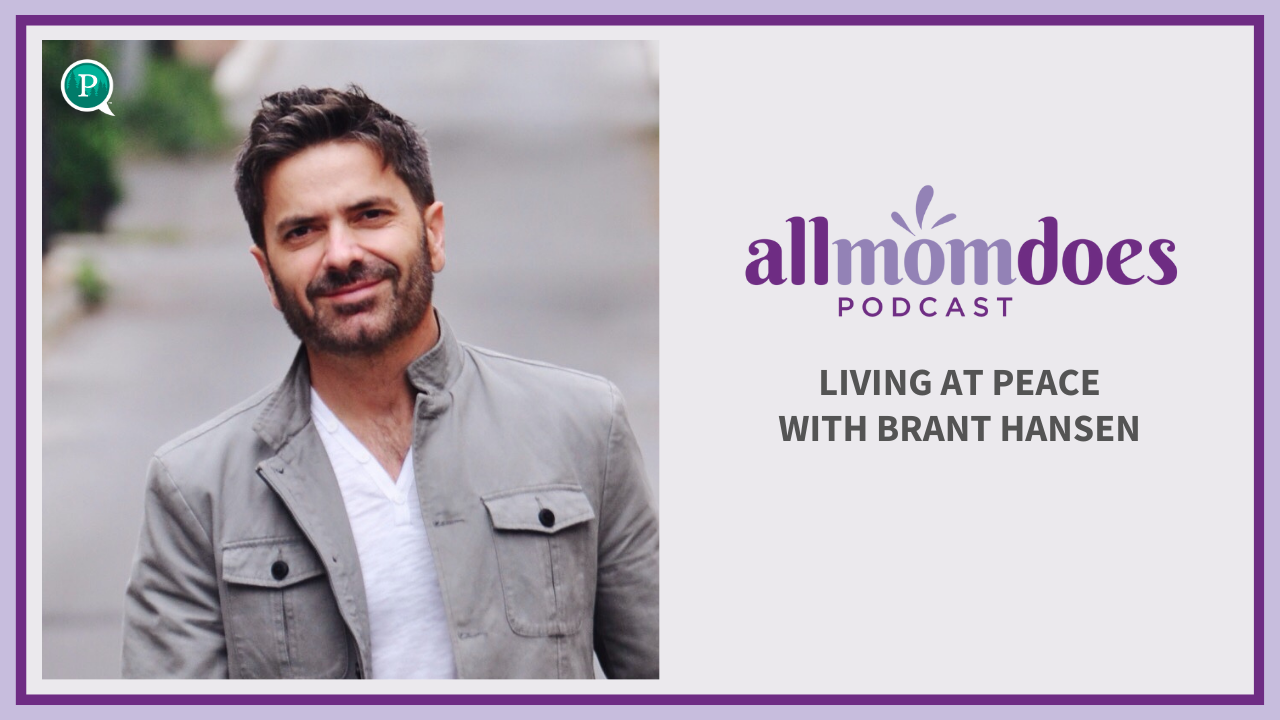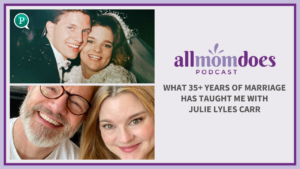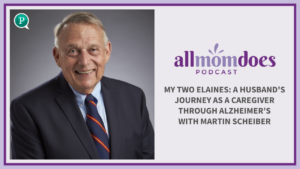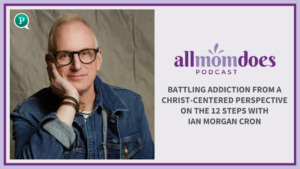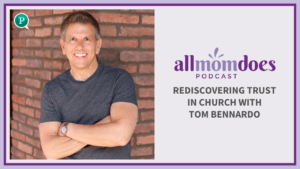If you think the world today is a crazy, confusing, stress-filled place, you’re not wrong. But that doesn’t mean you can’t live consistently in peace and joy, says Brant Hansen. He joins AllMomDoes host Julie Lyles Carr for a timely conversation about why peace and joy are different than an emotion, how we need to be modeling them to a younger generation, and why the kingdom of God is closer than we think.
Special thanks to George Fox University for sponsoring the AllMomDoes Podcast!
Show Notes:
Find Brant: Instagram | Facebook | X
Find Julie: Online | Instagram | Facebook | X | Pinterest
Find AllMomDoes: Online | Instagram | Facebook | X
Transcription:
Announcer:
Purposely. Your life, God’s purpose. Listen at onpurposely.com.
Brant Hansen:
His definition of joy was, “A pervasive sense of wellbeing regardless of circumstances.” You can literally be joyful and grieving at the same time.
Now if it’s an emotion, just an emotion, well that’s difficult, but it’s not. It’s this sense of wellbeing no matter what. Biblically, you see that all over the place, like Paul in a prison. He’s singing songs or he writing incredibly encouraging letters from prison. This is a different thing. You may not be happy you’re in prison, but you can still have this deep sense of wellbeing no matter what happens and that’s what I’m talking about.
Julie Lyles Carr:
Here we are, season seven of the AllMomDoes podcast, part of the Purposely Podcast Network. I’m Julie Lyles Carr. I love when we get to have a little trip back with someone who we’ve had on before, who was so amazing that when we knew we could have him back, we couldn’t wait. Of course, that’s got to be Brant Hansen.
Brant, how are you today?
Brant Hansen:
I’m good. How are you?
Julie Lyles Carr:
Doing well, just doing the podcasting thing, which I know that is a big part of your world. I feel like my listeners’ going to know exactly who you are, but just in case, give them the whole little elevator pitch. Where you are, what you do, all the things.
Brant Hansen:
Well, first of all, I am a new grandpa.
Julie Lyles Carr:
Congratulations.
Brant Hansen:
That’s pretty awesome.
Julie Lyles Carr:
I just became a grandmother, so I’m-
Brant Hansen:
Did you really?
Julie Lyles Carr:
Yeah, yeah. We are sure [inaudible 00:01:39]
Brant Hansen:
It’s the best.
Julie Lyles Carr:
It’s amazing.
Brant Hansen:
There are a few things in life that actually live up to all the hype.
Julie Lyles Carr:
This is one of them.
Brant Hansen:
It is. That’s fun. I’m a grandpa. I’m a radio guy from way back doing stuff, and I’m a husband of 33 years now. I talk about being on the spectrum. I was diagnosed years ago, way before it was cool. But yeah, so I do write about that. I write books now. I started writing books in 2015 and I’ve written several now, so this is my fifth.
Julie Lyles Carr:
That’s amazing. I loved our previous conversation. I’ll have Rebecca get that in the show notes for us, and we talked a little bit about your diagnosis process, what that was like. I have a nephew who’s on the spectrum. Those conversations are continuing and are really important because we have a whole generation of kids, Brant, as you know, that are now entering the workforce. We have employers trying to understand and figure out what it means to be neurodivergent-friendly and hopefully we’re making some strides. You’ve been a real voice for that and I thank you.
Brant Hansen:
Well, good. I occasionally hear from parents too. I did it again this morning. They’re just getting their kids diagnosed or something or they’re struggling themselves, like, “How do I do this?” There’s so much heartbreak involved. I do like being able to show the other side of it, having been through it, our son’s now an adult and I wouldn’t change a thing, I really wouldn’t. It’s good maybe to have somebody on the other side tell you that.
Julie Lyles Carr:
Absolutely, absolutely. Check out that show. Again, that one you can find in the show notes from Rebecca, because that conversation just was incredible.
Well, you’re back today because we’re going to talk about what I don’t think is intended to be a controversial topic, and yet I think it is.
Brant Hansen:
It is.
Julie Lyles Carr:
Drum roll please. The topic of the day is joy. The reason that I say that that to some degree is kind of controversial is because first of all, I don’t know that we have an agreed-upon definition, Brant. I feel like we all have our own connotation of what joy is, but we haven’t really soaked it down to its essence, so I want to get that from you. Then we’ll talk about some of the other components of joy that trip us up or times that maybe we feel like we shouldn’t be joyful, but maybe we should, but what does all this mean? Let’s start with the basics. I want to hear how you define joy.
Brant Hansen:
Well, I borrowed Dallas Willard’s definition. He’s a philosophy professor at USC for decades, and a top-rate philosopher. A lot of what you do is define terms and he’s also a believer and a pastor. His definition of joy was, “A pervasive sense of wellbeing regardless of circumstances.”
You can literally be joyful and grieving at the same time. Now if it’s an emotion, just an emotion, well that’s difficult, but it’s not. It’s this sense of wellbeing no matter what. Biblically you see that all over the place, like Paul in a prison. He’s singing songs or he is writing incredibly encouraging letters from prison. This is a different thing. You may not be happy you’re in prison, but you can still have this deep sense of wellbeing no matter what happens. That’s what I’m talking about.
Julie Lyles Carr:
What prompted you to start doing this deep dive into joy? Because you and I both know our publishers, they’re like, “What do you want to write on?”
You go, “I want to write on this.”
They’re like, “Oh, there’s already 17,000 books on that.”
You go, Oh, okay.
Brant Hansen:
Exactly.
Julie Lyles Carr:
Joy is a popular topic. We hear a lot about it. What was it for you that made it compelling enough to say, “I’m going to spend the long months in front of the computer screen by myself, rage eating M&Ms and crank out a book on joy”? What was it about the topic for you?
Brant Hansen:
Yeah. Well, okay, so being on Christian radio and stuff, I’ll talk about Jesus and anxiety.
Julie Lyles Carr:
Mm-hmm.
Brant Hansen:
I’ll say He told us we don’t need to be anxious, we can be like the lilies of the field, consider the birds of the air, don’t worry. The thing I’ve run into from people honestly is like, “Oh, okay, that’s so neat he said that. But realistically, you’re going to be worried.”
I’m like, “Hey, wait, I think Jesus is realistic. I don’t think he’s just saying crazy stuff and He’s giving us this lifestyle where we can become the sort of people who aren’t as anxious and we have this sense of wellbeing.”
In our culture at large, not just Christian culture, culture at large, it is controversial because people will say< “You can’t have a sense of wellbeing when this is happening. Don’t you see this new story?” It’s just a matter of which side you’re on, you’ll get a host of other news stories and some of them are quite true and could be quite evil things happening in the world, but that shouldn’t surprise God.
Julie Lyles Carr:
Right.
Brant Hansen:
When Jesus said, “Don’t be worried,’ people are like, “Well, yeah, but they didn’t know what was happening with this war.” No, they did. They’re an occupied territory, the group he’s talking to at the time. Their life expectancies aren’t as long as ours. There’s food scarcity they face, they didn’t have antibiotics, there’s all this stuff. When He’s saying this, He means it.
Julie Lyles Carr:
Right.
Brant Hansen:
I try to write a book that’s saying, “Actually this is accessible. This is something that we can be … we’re supposed to be so hopeful that people ask us why we’re so hopeful.”
Julie Lyles Carr:
Right.
Brant Hansen:
And it’s not-
Julie Lyles Carr:
I don’t know that we often exhibit that, right?
Brant Hansen:
Not at all. That’s too bad. I think Philip Yancey nailed it. He’s like, “Christians get upset about people who sin different than they do.” I think that’s true, but I think it’s also we can be just anxious about different things or we can be … I don’t think that’s a life we’re called to. I do think it’s quite realistic, so I talk in the book about various ways that we can actually live this out and not be worried and anxious. Even if everybody else is, we should have a different perspective and it’s quite doable.
Julie Lyles Carr:
I’m so glad you brought up the history of what was happening at the time that Jesus was here on earth for His earthly ministry. I can remember my parents saying to me as my husband and I started our family saying, “Wow, you guys are really walking into an era of raising kids and we don’t envy you for it because there’s this and this and this going on.”
I looked at my parents and I went, “Wait a minute, back up just a second. In the years previous to you having me, just previous to you having me, JFK was assassinated, RFK was assassinated, Martin Luther King Jr. was assassinated.” There was so much going on Cuba, all these different things. Then in my teenage-hood and into my college years and young adulthood, we had the Cold War and we had this and we had an economy collapsing and we had all these different things happening. Yet I will hear my adult kids today talking about all the things they’re concerned about, how much tougher it is, the things that are happening in the world, trying to align different precepts to what they think they’re seeing today. Why do we get so myopic, do you think, Brant, that we don’t understand that previous generations have also been through some stuff and if they came through some stuff with joy, maybe we can too?
Brant Hansen:
Yeah, well that’s why we can offer this perspective, and I’m glad you have an awareness of history because the people are utterly ignorant of this stuff. I don’t mean that as a slam, I just mean that perspective is just missing.
Julie Lyles Carr:
Right.
Brant Hansen:
Honestly, the best thing that you can do is have kids. The world needs kids with good parents out there. We need more children. If you think the world’s in trouble, that’s a help. But yeah, I’m glad you were aware of that.
As a slight tangent, maybe not really, but thinking about your parents, I’ve got this thing I keep saying when I’m talking to older audiences, I was on a TV show for older people yesterday. I’m like, “Would you guys quit watching the news 24/7?”
Julie Lyles Carr:
Yeah, might help.
Brant Hansen:
Would you shut it off?
Julie Lyles Carr:
Yeah.
Brant Hansen:
They can look at millennials or Gen Z and on and go, “They have this anxiety problem, they’re all anxious about this and that.” Yeah, that’s because you are.
Julie Lyles Carr:
Yeah.
Brant Hansen:
Humans traditionally have the oldest generation that they can get perspective from and be listened to, and then quietly told, “This too shall pass,” or, “Here’s how I handled that,” or, “Just take a breath.” But you’re anxious. The people who are in their seventies are glued and they’re upset about this, and what about that? Well, what do you think subsequent generations are going to do when you’re not at peace either? No one’s at peace. That’s just my riff I like to add just to challenge some of my people who are a little bit older than me.
Julie Lyles Carr:
I think it’s needed, and I will say my grandmother passed in 2020. She was 102, Brant. She was something else. My listener has heard me talk about her before. One of the things that was fascinating with her is through most of her life, now here is someone who was born in 1918, so she was coming into childhood at the height of the Great Depression. Then as she entered adulthood, she got married and we went straight into World War II. She had a young husband, so you just rinse, repeat, rinse, repeat, rinse, repeat all the way to 2020. As someone who grappled with a lot of anxiety in her life, what I noticed in the last, I’d say 10 years or so that I thought became really fascinating is she would look back on her life and say, “The Lord’s been so good to me. The Lord’s been so good to me.”
Brant Hansen:
Mm-hmm, right, right.
Julie Lyles Carr:
Now Brant, she went through some stuff. She had some stuff and she had seen a lot on the geopolitical scale as well.
Brant Hansen:
Right, right.
Julie Lyles Carr:
But that encouraged me that someone could get that kind of perspective and look back and be able to see that.
Brant Hansen:
Yes.
Julie Lyles Carr:
One of the things that I wonder about too, when I look at everything that’s going on in our world, the constant news that we can get 24/7, the way that impacts us emotionally, biochemically, spiritually, all of the exposure that we have, there will be times I have to admit that I’ll get excited about something or a blessing will come my way or somebody’ll send me something sweet or whatever, and it makes me feel a sense of joy, a sense of wellbeing, and then what comes right behind that is kind of a guilt, almost a survivor’s guilt, if you will. Oh, is it okay as a Christian who cares about others, who cares about what’s going in the world, is it okay for me to have this sense of feeling blessed if my fellow brothers and sisters are struggling? Conversely, should I be upset with someone who has joy in their life that they’re exhibiting because some things have gone well for them, if I’m in a hard season. I wonder if we are doing a whole lot of joy modulation over what’s happening not only around us, but how we evaluate other Christians’ lives, what we think God is doing in their lives versus ours. How do we get to a place that we alleviate some sense, some, I don’t know, little strange sense of maybe guilt when it comes to this whole idea of living in joy?
Brant Hansen:
Well, Christianity makes no sense if you can’t have peace, and that’s what we’re talking about. When we’re talking about joy being a sense of wellbeing regardless of circumstances, if you have to feel guilty about that, then none of this makes any sense. Jesus left His disciples a gift. He said, “I don’t give as the world gives, I’m going to leave you with my peace.”
If we are like, “Yeah, that’s a neat gift, but I’d rather have 24/7 news or I’d rather be worked up about this other thing,” that’s a big mistake.
Julie Lyles Carr:
Yeah, yeah.
Brant Hansen:
Everybody wants this peace too. I use the example of Paul on the ship in late part of Acts. He’s on the ship and it’s going to wreck. They’re in a huge storm. It says how many people are on board, it’s like 265 or whatever people. They’re all convinced they’re going to die, including the captain, including the people who are informed. They’re sea-salty guys. They know what they’re doing. They like, “We’re dying.” It’s like the plane is going down, directly down. Paul is on board and he’s not freaking out at all. He’s fine. Why? It’s because God had told Him, “This ship is going to wreck, but everybody’s going to be okay. Not one person’s going to die. Everybody’s going to be fine.”
From the outsider perspective, he’s nuts. If you’re on board and you’re going to die in this storm, and one guy’s like, “Yeah, we’re fine,” he’s crazy. There’s 264 other people that know they should be freaking out. But the reality is he’s not ignorant, but he would look ignorant from the outside, like he just doesn’t know. He’s not ignorant. He knows more.
Julie Lyles Carr:
Right.
Brant Hansen:
This is my point about peace. It’s like, yeah, all that stuff is going on. Yes, yes, indeed. It’s not out of ignorance. I can get just as worked up as anybody else about any political issue or geopolitical, fine. But the reality is, as a believer, you’re supposed to know more. There’s things we know, like how this all ends.
Julie Lyles Carr:
Right, the outcome. Mm-hmm.
Brant Hansen:
For instance. Yeah, so that’s one of the things I mention in the book is think about it like you’re watching a game for the first time. It’s your favorite team, they’re down three touchdowns, the refs are ripping them off. They’re dropping passes, they’re fumbling, the coaches making, you get really worked up. But if your team comes back and wins and then you rewatch that game, it’s just really fun to watch even when they’re down by three touchdowns. Because why? You’re not nervous anymore. You’re not mad at the refs. You know how it ends. There’s supposed to be something about that and the way that God changes us to become people who are at peace, that it’s not a lack of knowing, it’s not ignorance, it’s not not caring. It’s the opposite of this, knowing all of that and then knowing more. I think that’s a really strong hand that we get to play from if we want.
Julie Lyles Carr:
I love that line, that we already know more. We already know more.
Brant Hansen:
Yeah.
Julie Lyles Carr:
That is so powerful. It’s not about cramming more information, getting one more commentator, getting one more perspective, it’s that we already know more. We know the outcome. I love the title of the book. Life is Hard, God is Good, Let’s Dance. I have to say, we are a kitchen-dancing family over here-
Brant Hansen:
Good.
Julie Lyles Carr:
… and so that title really resonates with me.
You said something at the top of our conversation that I want to go back and revisit a little bit because I think it’s one of the areas that we can get tripped up, and this is the difference between joy and peace. We often categorize that as an emotion, and we’re talking about something that’s very different. How do we learn to, yes, feel our feelings? God made our feelings, God made our emotions, and we all know that there’s not a whole lot of good that comes from trying to squish down real feelings that we’re having. But how do we move from a place of real emotions and transition it to this state of being? A state of being and joy? A state of being in peace? How do we do that?
Brant Hansen:
Yeah, okay. Emotions happen, right, so things like anxiety that can happen. Although I think over time you could become a different sort of person, you don’t feel it as much automatically, but something can happen to you. The way the Bible attacks that, Jesus says, “Consider the lilies of the field. Consider the birds of the air.” He says, “Think about these things.” He actually doesn’t say, “Clear your mind,” ever. A lot of moderns will say, “You just need to meditate, clear your mind entirely to help with anxiety.” That actually doesn’t work. It’s really interesting to read studies about that. It makes people more anxious because you can’t clear your mind. Jesus’ approach is not to clear your mind, it’s actually fill it with true things about God’s love for you. Like your 102-year-old great-grandma, was it great-grandma?
Julie Lyles Carr:
Grandmother, yeah. Grandmother, yeah.
Brant Hansen:
The grandmother, okay, so her willingness to go, “You know what? God’s been good to me.” You rehearse the things where He’s been good, so that’s one way to do it.
You speak to your emotions. Your emotions are real, but they don’t determine reality. This happens repeatedly in the Bible. Like in Lamentations, Jeremiah is literally looking around the news of the day, he can see what’s happening. His entire world is falling apart. His country’s going down, everything’s going to be dust and ashes. It’s being destroyed and he knows it, so that’s the truth, but-
Julie Lyles Carr:
That’s the reality, yeah.
Brant Hansen:
… he says, as he’s talking about it, he goes, “Yet I call this to mind and therefore I have hope. Because of God’s great love for us, we are not consumed.” He talks about His faithfulness and His mercies are new every morning. He calls the truth to mind, actively brings it to mind. David does this in Psalms, “Why are you so downcast, oh my soul? Put your trust in,” he’s talking to himself. He’s talking to his own soul. He’s talking to his emotions. “Why are you so downcast?” Yeah, emotions are real, but we can speak reality to them.
Then Paul is writing about your mindset, and he says, “Whatever’s true, whatever’s noble, pure, lovely, admirable, excellent, praiseworthy, think about these things.” And he advises us, “If you are anxious about something, tell God what you need and then be thankful for all He’s done. Tell Him why you’re thankful.” It’s literally tell God what you need and then think of all the reasons to be thankful. Gratitude chases out anxiety. We know this. Modern psychology knows this. It just happens to be a complete theme of the Bible again and again to give thanks, not because God needs our thanks. He’s not like, “Please thank me.” We’re told to do that because it’s good for us, for our own flourishing, our own mindset. If we are interested in doing away with anxiety in our lives over time, it’s not a magic pill, but there are things that we can do and practices so we become different sorts of people and it works.
Julie Lyles Carr:
Right, right. You mentioned my grandmother. One thing that I thought was so fascinating, Brant, in the last few years of her life as well, is her saying, “God’s been so good to me,” even though she had 100 years of some, wow, life. She experienced a lot of things. One thing she used to say that I thought was really interesting, as you can imagine when you hit 102, you are the last of the survivors. She had outlived everybody. One thing that she would say on occasion, which I thought was really profound, and she’d usually hit it with me when I wasn’t expecting it, and then I’m trying to pull the tears back in, she would say, “You know what I’m so excited about?” She was from Mississippi.
I’d say, “What are you so excited about, Giggy?”
She goes, “Meeting Abraham. Can you imagine getting to talk to Abraham and then I want to talk to Noah. I have some questions and I just want to talk to Noah.”
I thought in my head initially, Brant, I’m thinking Abraham, who? Abraham, what? Then it dawns on me. She is thinking of the joy of who she’s going to meet and experience as she realizes her life is wrapping up. I’m not trying to cast her as a perfect person or the perfect spiritual, whatever, I’m just saying that kind of joy I think might have something to do with why she lived as long as she did.
Brant Hansen:
Bingo.
Julie Lyles Carr:
Because even when she was not really surrounded by peers at all anymore, she was still thinking of adventures that were going to be amazing on the other side of eternity, which is just-
Brant Hansen:
Okay, right.
Julie Lyles Carr:
… wild to think about, right?
Brant Hansen:
It is, I love it. This is one thing I talk about in the book is the Kingdom of God is so awesome, it’s so beautiful. If you focus on that, the other stuff kind of falls in line, but people don’t know what the Kingdom of God is really like because the churches don’t talk about it, which is weird because it’s Jesus’s favorite topic.
Julie Lyles Carr:
Yeah, brings it up again and again.
Brant Hansen:
He’s constantly talking about, right. It’s His number one topic, talks about it all the time. He’s trying to describe it. He’s saying, “My Kingdom is here. It’s breaking through. It’s available to you now.” That’s the good news. That’s the gospel is His Kingdom is here.
I try to explain it, speaking of your grandma, everybody is yearning for this kingdom, it’s so beautiful, but they don’t know it. Even if they’re not believers in God, they’re still yearning for it and it shows up.
I’m just musing on this, it’s not real science, but I’m like, I think we get goosebumps every time we see it.
Julie Lyles Carr:
Mm-hmm. Yeah, yeah. Those moments, we recognize it, yeah.
Brant Hansen:
Right, so if you watch YouTube stuff, I see soldiers that show up and there’s reunions with their families, surprise their daughters or something. You get goosebumps, it’s hard not to cry.
Julie Lyles Carr:
Oh, yeah.
Brant Hansen:
See a daughter just sobbing in her dad’s arms or you see someone seeing for the first time you see someone hearing for the first time.
Julie Lyles Carr:
Yeah.
Brant Hansen:
You cry or you get goosebumps. You watch the Olympic opening ceremonies where all these nations are gathered in peace, and there’s this processional. You get goosebumps. Music that goes from creation to fall to redemption, things are structured that way, but it’ll hit a certain chorus again and then modulate, and we would get goose, because it’s this restoration thing. When we see elements like shards of the Kingdom, hints of it, we get goosebumps and we start crying because we’re yearning for it so much. We want it so bad.
Julie Lyles Carr:
Yeah.
Brant Hansen:
I love that your grandma derived joy out of that because she’s like, “I’m going to have this reunion.” We’re getting ready for something really wonderful. Everything’s going to be restored. The sad things are going to come untrue. I know that’s Lord of the Rings, not the Bible but it’s true. We have reason to be joyful here, and we’re playing from a really strong deck. Even if you’re going through temporary pain, we know this, and I’m not trying to diminish the pain. I’ve been through stuff too, but we know this, it’s temporary. Whatever it is, it’s temporary. We know this. It’s a really great place to be and we have reason to be very, very thankful.
Julie Lyles Carr:
And hopeful and joyful.
Brant Hansen:
And hopeful.
Julie Lyles Carr:
I love that you brought up this place where we probably recognize little glimpses. We have a soul recognition of oh, that’s it. That’s it. We have a child, she’s not a child anymore, she’s all grown up, she’s married. She has significant hearing loss and the experience of seeing her receive her first hearing aids and then all of the other things that we went through in the journey with her, you’re so right. There was something so sacred about watching these mechanical pieces of technology get turned on and her response and our response. Brant, there are those moments if we’re willing to look for them.
Brant Hansen:
Right. Jesus is saying, “The Kingdom’s breaking through. Let me show you how,” and He heals somebody.
Julie Lyles Carr:
Yeah, yeah.
Brant Hansen:
He could have done any kind of miracle, but three quarters of his miracles are healing because He’s saying, “This is an advanced trailer of heaven. You’re getting an advanced trailer.” His Kingdom is breaking through now, but we’re going to be at this big party and it’s going to be nonstop goosebumps, I have a feeling, because it’s going to be one person after another that can run and play for the first time, jump and dance, someone who’s been through. We get to see that. Someone who can see for the first time, people reunited who’ve gone on before, husbands and wives and family. That’s what we’re headed for.
Julie Lyles Carr:
Right.
Brant Hansen:
That kingdom is so good we need to talk about it more because it’s the good news.
Julie Lyles Carr:
Absolutely. How do we, Brant, get to a place, since we’re in a situation right now that some of us have been through some stuff when it comes to our communities of faith, some of us are getting a little jaded about some of the things that we’ve seen because we want our faith communities, we want our churches, we want our spiritual leaders to be that glimpse of the Kingdom of Heaven. When things go sideways, and we know sometimes that they will, and we know people are human and we know none of us are perfect, we know all of that list. However, we can still be left with a sense that something that should be one of the places of our greatest peace and joy, which is that place of being engaged in the faith community, can be a place of really deep hurt. You and I have been around these things a long time.
Brant Hansen:
Yeah.
Julie Lyles Carr:
We’ve seen it come and go.
Brant Hansen:
Long time.
Julie Lyles Carr:
We’ve experienced it, we’ve felt it. How do we maintain a place where we don’t become so jaded that it colors our joy when it comes to things of a spiritual experience?
Brant Hansen:
I can speak to that very directly because my background being a preacher’s kid in a very traumatic, hypocritical home.
Julie Lyles Carr:
Mm, yeah.
Brant Hansen:
The absolute extreme. That’s what I grew up in, and I get it. I’ve seen it being in the Christian industry, there’s all sorts of stuff. I’m like, “Oh man. More narcissism, more whatever.” It’s all over the place. That’s true.
First thing I would point you back to is that Kingdom of God we were just talking about. I am not going to allow hypocrites or narcissists who are on stages, of course, you put people on stages, guess who’s going to come out of the woodwork to get on stage? We structured it that way. That’s not-
Julie Lyles Carr:
Yeah, we did it. Yeah, yeah.
Brant Hansen:
Yeah. Jesus’s vision for, we do that. But I’m not letting them take away the best relationship I can have in my life. I’m not giving them the power because of their ego trips or the stuff that they’ve done. I’m not giving them further power to do that to me. Some awful stuff may have happened in my childhood or stuff I’ve seen as an adult, but I’m not going to let them do that. I get to partner with God in life. When I pray with Him in the morning, I’m talking with Him about what He and I are doing in life together. I’m not missing out on that. I’m not going to leave that. In fact, the alternatives to Jesus are not good to me. I think He’s the only one who acknowledges the reality of human sin, which is pretty empirically verifiable, I would say. He acknowledges it and then He actually does something about it.
Julie Lyles Carr:
Right, right.
Brant Hansen:
Then His way of life is so genius. The stuff that He tells us to do is so freeing. We know this. It’s a better, lighter, more childlike way to live. It’s more joyful. It’s more fun.
Lastly, I’ll say this. I work for this hospital network CURE that we have these hospitals around the world that are for the poor. We do orthopedic and neurosurgeries for kids who have correctable disabilities. They’re all done in the name of Jesus, all these surgeries, 20,000-plus a year, and I get to see that.
Julie Lyles Carr:
Yeah, wow.
Brant Hansen:
See kids that can run and play for the first time, and moms who are convinced they’re cursed and they’re told, “No, you’re blessed. God loves you and your child.”
I see that and I’m like, “I’m not leaving that.” Yeah, you can get jaded about stuff that’s pretty awful, but man, the kingdom is so good. Don’t let those people ruin that for you. Don’t let them have that power. That’s what I think.
Julie Lyles Carr:
Absolutely. That brings me full-circle back to talking about out that God already knew these things. I look at Eli, who becomes the most important human mentor for the prophet Samuel and all the incredible things that Samuel did, but Eli had two sons and they were absolutely actively engaged and employed by the church of the Old Testament at that time, and they were awful. They were just not great guys. Yet it did not hold back Samuel, even watching all that, from accepting the wisdom that Eli had to share and from missing God’s purpose for his life. He didn’t get all mired up in what those guys were doing and the mess they were creating. He went forward and did something powerful and with a lot of joy. Brant, I think that that point just is absolutely right there. I love that you’re engaged with CURE. What a beautiful thing.
All right, friend. The book is called Life is Hard, God is Good, Let’s Dance. This was just a thimbleful of all of the wisdom and humor and insight that Brant has to offer.
Brant, where can the listener go to find out more about you and to follow along on all your adventures and all the things that you’re up to?
Brant Hansen:
Sure. Well, I have a website. It’s branthansen.com and all that stuff is there. You can go to Amazon and Barnes and Noble, all the bookie places and get the book. But I do hope it’s a blessing. I hope it’s funny. I try to make it funny, but that’s always in the eye of the beholder, but if you get a kick out of it, that’s wonderful.
Julie Lyles Carr:
Yeah, absolutely. Well, Brant, I can’t thank you enough for taking the time to be back on the show. I really appreciate you.
Brant Hansen:
My pleasure, great to talk to you.
Julie Lyles Carr:
Great to talk to you.
All right, listener, you’ve got your directions. Go check out all the great stuff that Brant has. Rebecca has it in the show notes, so go check it out there. I’m Julie Lyles Carr, all the places, mainly on Instagram, and I love when you come over and say hi over there. Also AllMomDoes, allmomdoes.com. AllMomDoes on the socials. It’s a great community of women who are walking through a lot of the same seasons of life that you are and you’re going to find encouragement and inspiration and I’ll see you next time on the AllMomDoes podcast.
Follow this podcast:

